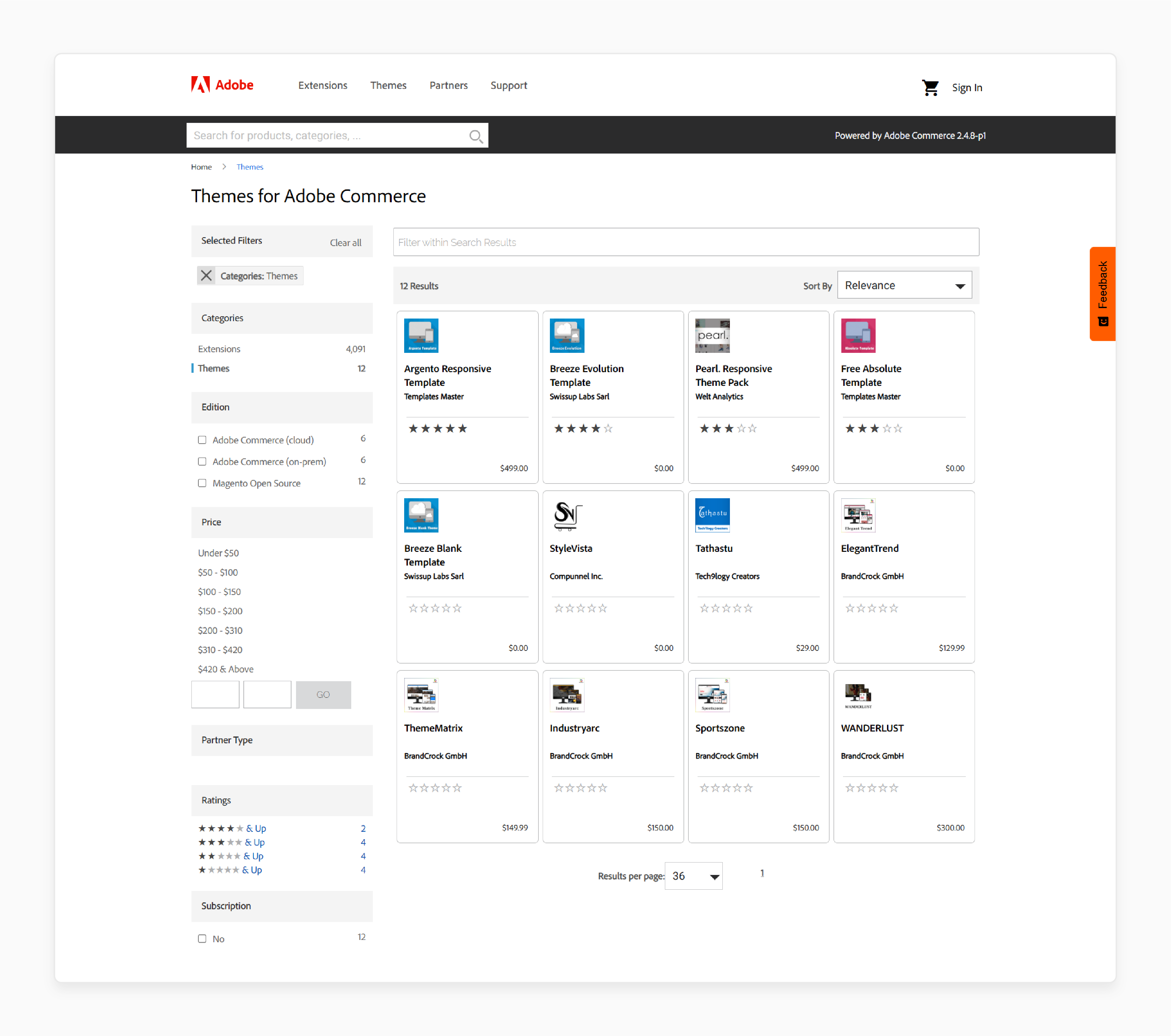
BigCommerce vs Magento: Which Ecommerce Platform is Right for You?
[Updated June 18, 2025] Struggling to select the correct ecommerce software platform in 2025?
Choosing between BigCommerce and Magento can shape your online business growth. Making the wrong choice can impede your business and waste resources.
Key Takeaways
-
Choose BigCommerce for simplicity; pick Magento for custom control.
-
BigCommerce has built-in features; Magento provides deep customization.
-
BigCommerce offers native AI; Magento allows advanced custom AI.
-
BigCommerce has built-in social tools; Magento offers custom flexibility.
-
Both platforms support flexible, modern storefront building methods.
-
Both platforms provide strong SEO, payment, and mobile features.
Should You Choose BigCommerce or Magento in 2025?
Choose BigCommerce if you:
-
Want an all-in-one hosted solution with predictable pricing
-
Need a quick launch without technical expertise
-
Prefer built-in features over custom development
-
Want 24/7 support and automatic updates
-
Run a small to medium business with standard needs
Choose Magento/Adobe Commerce if you:
-
Need complete customization control and options
-
Have dedicated development resources available
-
Need complex B2B functionality and features
-
Want data and hosting ownership
-
Operate an enterprise with unique business requirements
BigCommerce vs Magento Ecommerce Platform
1. Features
BigCommerce
BigCommerce lets you create stores with single-page checkout and unlimited products. Websites come with no transaction fees. Apps and add-ons boost your store's performance.
AI-Powered Features (2025):
-
AI drives product recommendations for customers
-
Chatbots handle customer service inquiries
-
Analytics manage inventory levels
-
Pricing changes increase revenue potential
-
Tailored shopping experiences boost customer approval
Magento (Adobe Commerce)
Magento is an open-source platform that allows for customization. Built-in features include checkout and payment, shipping, catalog management, and instant purchase. Magento is powerful but requires technical skills. Customizing and managing the platform requires coding knowledge.
2025 Cloud-First Approach
Adobe Commerce is moving to a cloud-native strategy. Adobe Commerce as a Cloud Service will launch in June 2025. The platform will have three main offerings:
-
Adobe Commerce on Cloud for single-tenant customization
-
Adobe Commerce Optimizer for headless storefronts
-
AI features through Adobe Sensei
2. Pricing
BigCommerce Pricing (Updated 2025)

BigCommerce offers four pricing plans:
i. Standard Plan ($39/month-$29/month for annual)
For beginners and small businesses, there are basic features. They receive online sales support up to $50,000 per year.
ii. Plus Plan ($105/month-$79/month for annual)
Medium-sized businesses can access customer groups. They have abandoned cart savers to recover sales.
iii. Pro Plan ($399/month-$299/month for annual)
Big businesses can benefit from Google reviews. They have a faceted search for better product discovery.
4. Enterprise Plan (Custom)
Fast-growing companies have custom pricing options available. They receive all features from lower plans and premium support.
Magento (Adobe Commerce) Pricing (2025)
Adobe Commerce provides three main editions:
-
Magento Open Source costs nothing upfront
-
Adobe Commerce on Cloud requires custom pricing
-
Adobe Commerce as a Cloud Service launches June 2025
The Open Source edition downloads free of charge. Hosting and additional services needs other payments. Adobe Commerce editions charge yearly license fees. Revenue and complexity requirements determine final costs. Developers help with customization and ongoing maintenance.
3. Ease of Use
BigCommerce
Setting up BigCommerce follows straightforward step-by-step instructions. The dashboard guides the store creation process. Technical terms might confuse users without expertise. The design interface separates the backend and storefront, causing confusion.
Magento
Setting up a Magento store requires technical knowledge. The installation involves steps that can make deployment difficult. The Magento admin interface gives access to all functions. The dashboard is easy to use and shows all management options. Users without technical skills may struggle with store management.
4. Apps & Extensions
BigCommerce
BigCommerce has over 600 apps in categories like marketing, reporting, payment, and protection. These apps add to your store's functions.
Magento
Magento has powerful built-in features and extensions. The Magento Marketplace offers over 3,500 extensions. Third-party plugins work with the core platform. Extensions add functionality to your store in various areas.
5. Payment Options & Fees
BigCommerce
Adding a payment gateway is quick and simple. BigCommerce supports over 65 payment gateway options. No transaction fees apply to any plan. Credit card rates vary by pricing plan.
Magento
Magento has over 450 payment gateway apps. Some gateways charge transaction fees. Adding a payment gateway is part of customizing your store. The choice of gateway depends on customer demands.
6. SEO Features
BigCommerce
BigCommerce has built-in SEO features. These include custom URLs, microdata, 301 redirects, and a CDN. Users can also add SEO apps for more functions.
Magento
Magento's built-in SEO features, XML sitemaps, and 301 redirects help with search ranking. The admin panel lets you add metadata. Extensions like SEO Toolkit and Advanced SEO Suite add more SEO functions.
7. Themes
BigCommerce

BigCommerce offers 15 free themes and over 100 paid themes ranging from $150 to $399. All themes work on mobile devices. The Stencil framework makes theme customization easy.
Magento

Magento gives seven native theme options. Thousands of third-party themes support store customization. Code knowledge allows custom theme creation. Developers can build themes for certain requirements.
8. Growth
BigCommerce
BigCommerce has an open API and 100% uptime to support business growth. Multichannel connections grow with your operations. The platform is designed for businesses that are expanding.
Magento
Magento offers high output and can grow. It can handle large catalogs and heavy traffic. The platform can meet complex business needs.
9. Protection
BigCommerce
As a hosted platform, BigCommerce includes protection in its monthly plans. It uses firewalls, file scanners, and intrusion detection. 24/7 monitoring protects store operations.
2025 Protection Updates:
-
Advanced biometric verification for user authentication
-
Multi-factor authentication that works with existing systems
-
Stronger encryption protocols to protect sensitive data
-
Protection patches applied without interruption
Magento
Magento users are responsible for their own protection. They need to handle SSL certificates, protection plugins, and PCI compliance. Magento releases protection patches at regulated intervals. Applying them can challenge non-technical users.
Adobe Commerce Protection (2025):
-
Protection-specific patches get applied when needed
-
Content policy headers protect data
-
Threat detection monitors suspicious activity
-
Compliance with data protection regulations
10. Support
BigCommerce
BigCommerce provides 24/7 support through phone, live chat, email, and a help center. Enterprise plan users receive priority support.
Magento
Magento Open Source users access forums and documentation. Magento Docs and the community provide helpful resources. The Commerce and Cloud Edition users get chat support. Email support serves paid plan customers.
BigCommerce vs. Magento: 2025 Ecommerce AI and ML Use Trends
Experts expect the AI-driven ecommerce market to hit $8.65 billion in 2025, growing to $22.60 billion by 2032. Both platforms are incorporating AI features.
BigCommerce AI Features:
-
Native AI for product recommendations
-
Chatbots for customer service
-
Inventory management to avoid stock issues
-
Variable pricing to increase profit margins
Magento AI Features:
-
Adobe Sensei for tailored customer experiences
-
AI-driven content creation tools to work faster
-
Reporting for business information
-
Custom AI additions for more options
Voice Commerce and Social Shopping
Voice search accounts for 50% of searches. 70% of consumers expect social media shopping. Platforms are changing for these customer behavior patterns.
BigCommerce:
-
Built-in social media connections
-
Voice commerce apps for hands-free shopping
-
Social selling channels to increase revenue
Magento:
-
An open API for voice commerce connection
-
Social commerce customization to meet business needs
-
Headless architecture for omnichannel experiences
Composable Commerce
Composable commerce is changing how ecommerce gets delivered in 2025. Businesses have more options in creating digital storefronts. Component-based approaches are replacing old platform structures.
BigCommerce:
-
Open SaaS approach with API-first architecture
-
Pre-built connections for composable commerce
-
Headless commerce for frontend options
Magento:
-
Composable architecture with microservices for more options
-
Adobe Commerce Optimizer for headless setups
-
Customization options for unique requirements
Other Distinctions Between BigCommerce & Magento
1. Software as a Service (SaaS) vs Open Source Platform
BigCommerce operates as a SaaS ecommerce platform. Complete packages include hosting, protection, and updates. Monthly fees cover all-in-one packages. Businesses want turnkey online store operations.
Magento functions as an open-source platform. Source code access allows changes and customization. Customization and options increase with code access. Users handle Magento hosting, patches, and updates.
2. Drag and Drop Page Builder vs Custom Coding
BigCommerce offers drag-and-drop builders that are easy to use. Store owners can design and customize their sites without coding knowledge. This saves time and resources.
Magento requires coding understanding for site customization. Platform options and control increase with knowledge. Magento developers customize sites based on preferences. Complete customization requires technical development expertise.
BigCommerce vs Magento Ecommerce Website Similarities
BigCommerce and Magento create powerful ecommerce websites. Common features support online business operations.
1. Payment Gateway Connection
Both platforms support various payment gateways. They provide safe shopping experiences for customers. Payment processing is available through many gateways.
2. PCI Compliant
Both platforms are PCI compliant, using industry-standard protection measures to protect customer data. They meet the compliance requirements for payment processing.
3. SEO and Marketing Tools
Both platforms have built-in SEO tools. They also offer marketing tools to increase sales. These tools help with search engine ranking and store exposure.
4. Mobile-Ready Design
Both platforms offer mobile-ready themes with designs for device compatibility. This provides consistent shopping experiences across all devices.
5. AI-Powered Features
Both platforms will keep developing AI for tailored service and customer service reporting. This aids bulk, complicated operations and customer experiences.
Hosted vs Self-Hosted Ecommerce Site
BigCommerce handles hosting, protection, and updates. This hands-off approach attracts businesses seeking simplicity. Online store management requires minimal technical involvement.
With Magento, store owners must manage their own setup, including hosting and protection. This gives them complete control. The choice of hosting depends on the business size and requirements. The higher level of control and customization makes up for the complexity.
FAQs
1. Which is better: BigCommerce or Magento?
The choice depends on your needs. BigCommerce is ideal for small businesses. Its all-in-one packages offer simplicity along with predictable costs. Magento suits enterprises needing customization. It provides control over complex functionality.
2. Is BigCommerce good for ecommerce stores?
BigCommerce offers built-in sales features. It includes SEO tools. The platform has AI-powered functions. You can connect many channels with little effort. This makes it a strong choice for eCommerce stores.
3. Is Magento free?
Magento Open Source downloads and installs for free. Hosting and developer help need other payments. Adobe Commerce editions need yearly licensing fees.
4. How do BigCommerce and Magento compare for AI features in 2025?
Both platforms offer AI for businesses. BigCommerce has built-in AI tools. It also provides chatbots for customer service. Magento includes advanced AI customization through Sensei. Open connections allow for custom AI additions.
5. Which platform is better for voice commerce and social selling?
BigCommerce has built-in social commerce connections. It makes the setup easier. It connects to many social platforms. Magento allows for custom voice commerce. It demands more development work. Customization increases complexity with Magento.
6. What are the total costs of ownership for each platform?
BigCommerce has predictable monthly costs with no fees. Magento total costs vary based on requirements. Hosting needs affect pricing a great deal. Development and maintenance also influence costs. Magento costs can exceed BigCommerce for some functionality.
Summary
BigCommerce vs Magento needs a business needs analysis. Each platform offers unique benefits for different store types. Below are the main article highlights:
-
BigCommerce meets the standard needs of small to medium-sized businesses. Magento serves enterprises with unique business demands.
-
Use BigCommerce for its simple drag-and-drop builder. Use Magento when you have dedicated developer resources.
-
BigCommerce has predictable monthly pricing with no fees. Magento costs vary with hosting and development needs.
-
BigCommerce includes protection and support with all plans. Magento users manage their own store protection unless they choose managed hosting.
-
BigCommerce provides built-in AI for product recommendation tools. Magento offers advanced AI customization through Adobe Sensei.
Consider Managed Magento Hosting for the complex hosting needs of your online store.
[Updated June 18, 2025]





